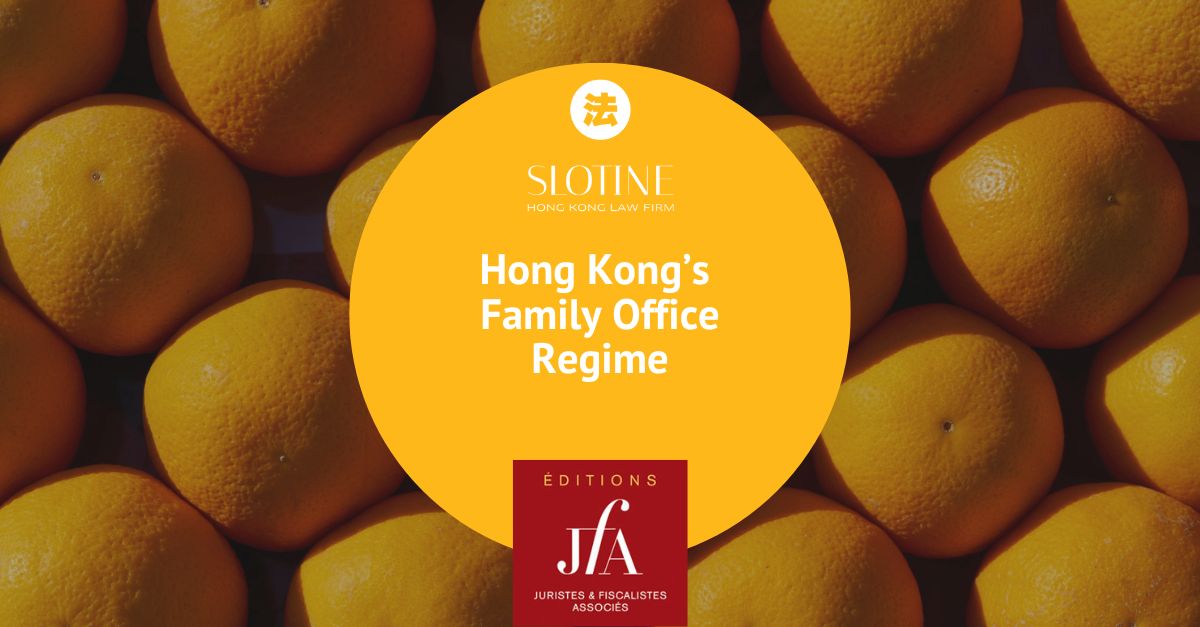With nearly 3,000 family offices, Hong Kong stands out worldwide as a significant player in this field and strives to have regulations in line with global legal and tax issues (the latest update being that of the visa regime, available since April 2024). To gain an overview of the regime, it is worth reviewing several rules relating to establishing a family office in Hong Kong, the legal structure, the tax regime, compliance requirements, employment and immigration issues, and other commercial considerations.
Family offices are specialist entities set up to manage the wealth and affairs of one or more families. They offer a wide range of services, including investment management, estate planning, philanthropy and family governance. There are two main types of family offices:
- the single-family office (SFO) which manages the assets and investments of a single family;
- the multi-family office (MFO) which provides services to several families.
The advantages of Hong Kong
Hong Kong is an attractive place to set up family offices because of the following advantages:
- strategic location: gateway to China and the Guangdong-Hong Kong-Macao Greater Bay Area;
- financial infrastructure: Hong Kong is one of the world’s largest financial centres, with a wide range of financial services, including wealth management, banking and investment services;
- favourable legal and tax environment: the Hong Kong government encourages the family offices sector through tax initiatives such as the income tax exemption for family-owned investment holding vehicles (FIHVs) and legal initiatives such as the Capital Investment Entrant Scheme for asset owners;
- renminbi liquidity: Hong Kong has the largest reserve of offshore renminbi liquidity, making cross-border transactions and investments in China easier;
- wealth management centre: it is the second-largest cross-border wealth management centre in the world.
The establishment and legal structure of a family office in Hong Kong
A family office in Hong Kong must be registered with the following bodies:
- the Companies Registry, which is responsible for the incorporation of companies and the registration of foreign companies established in Hong Kong;
- the Business Registration Office, Inland Revenue Department (IRD), which issues the business registration certificates required to carry on business legally.
MFOs must obtain separate financial licences from the Securities and Futures Commission (SFC) for their regulated activities in Hong Kong. SFOs are generally exempt as they only provide services to entities within a single family.
The Hong Kong tax system
General tax environment
Hong Kong has a simple, low-tax environment, with a territorial concept of taxation. It offers various tax incentives to facilitate business development, making it an attractive jurisdiction for establishing family offices. As of August 2023, Hong Kong has tax treaties with 47 jurisdictions, including one with France [updated list of comprehensive double taxation agreements concluded by Hong Kong].
Profits tax – profits tax is levied on taxable profits. Under the two-tiered profit tax rates regime, the first HK$2 million of taxable profits are taxed at 8.25% and the remainder at 16.5%. There is no withholding tax on dividends or on interest received by a foreign entity from a Hong Kong taxpayer.
Foreign-source income, such as dividends, gains on disposals, interest, and intellectual property income, may be declared offshore or non-taxable, subject to specific conditions.
Salaries tax – salaries tax, calculated at a progressive rate ranging from 2% to 17% or at a flat rate of 15%, is levied on employment income arising in Hong Kong, including certain benefits.
Property tax – this is charged at a standard rate of 15% on the net assessable value of the property.
Stamp duty – Stamp duty applies to the transfer of Hong Kong shares and the transfer and lease of immovable property in Hong Kong.
Other taxes – There is no capital gains tax, inheritance tax, gift tax, value-added tax, goods and services tax or sales tax.
Tax considerations specific to family offices
Unified fund exemption (UFE) – the UFE is the existing income tax exemption regime in Hong Kong, offering tax exemption to funds managed by entities authorised by the SFC or considered to be qualified investment funds. However, this regime is not suitable for SFOs.
The main features of the FIHV Tax Concessions Ordinance – on 19 May 2023, the Inland Revenue (Amendment) (Tax Concessions for Family-owned Investment Holding Vehicles) Ordinance 2023 was gazetted. The Ordinance aims to promote family-owned activities in Hong Kong. It offers a 0% tax rate on assessable profits of qualifying FIHVs derived from qualifying transactions and incidental transactions (subject to a 5% threshold). No prior approval from the IRD is required.
- SFO eligibility criteria:
- must be a private company, incorporated in or outside Hong Kong, and normally managed or controlled in Hong Kong;
- at least 95% of its beneficial interests must be held by one or more family members;
- must provide services to specific individuals and receive fees for these services, which are chargeable to Hong Kong profits tax;
- must satisfy the rule that at least 75% of its assessable profits are derived from services provided to specified family members (“specified family members” are: (a) an FIHV that is related to the family; (b) a family-owned special purpose entity (FSPE) in which the FIHV referred to in (a) has a beneficial interest (direct or indirect); (c) an intermediary FSPE of an FIHV referred to in (a); and (d) a family member).
- FIHV eligibility criteria:
- must be a group of persons (corporate or unincorporate) or a legal arrangement, including corporations, partnerships and trusts;
- at least 95% of the beneficial interest must be held by family members at any time during the year;
- must be managed by an eligible SFO in the family carrying out investment activities for the FIHV;
- must be normally managed or controlled in Hong Kong during the assessment period.
Additional considerations:
- stamp duty refund – eligible new talent who pay additional stamp duty on residential property can claim a refund if they become permanent residents after seven years.
- substantial activities requirement – the substance of the business must be centralised in the SFO. Outsourcing of core income-generating activities is permitted, provided it is not intended to circumvent the substantial activities requirements.
- election and tax reporting obligations – eligible FIHV’s must make an irrevocable formal election and file an annual tax return with the IRD.
Compliance and declaration requirements
Family offices must meet strict compliance and reporting standards to ensure compliance with legislation and regulations. These include the following:
- financial licences: obtaining the necessary licences from the SFC for regulated activities;
- ongoing compliance: regular reporting and compliance with local laws, including anti-money laundering and counter-terrorist financing regulations;
- exemptions for SFOs: SFOs, which serve entities from only one family, often benefit from exemptions from certain regulatory requirements that apply only to MFOs.



